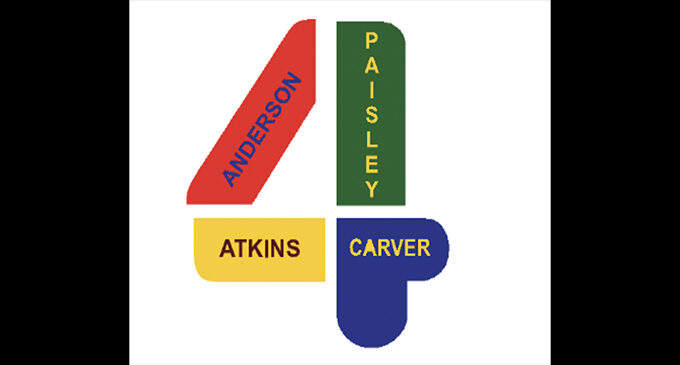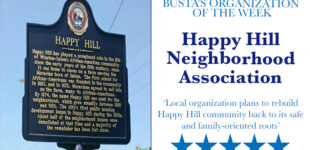Big 4 Legacy Group offers the Big 4 RAP for students Paisley I.B. School
The Big 4 Legacy Group, formerly known as The Big 4 Alumni Association

RAP (Respect, Affirmation, Problem Solving) meets weekly at Paisley
By Dothula Baron
The Big 4 Legacy Group, formerly known as The Big 4 Alumni Association, is a 501(c)(3) organization that is composed of alumni of the historically Black high schools in Winston-Salem – Anderson, Atkins, Carver and Paisley – schools for African American youth that existed before integration. Its purpose is to preserve the legacy of these schools and the communities in which they existed.
The organization was founded with the intention of celebrating these schools, their staff, faculties, and memories. Through the years, they have held annual events that included teachers’ luncheons, basketball games, golf tournaments, dances, gospel concerts, and community education programs. In the early years, the Big 4 held galas that attracted as many as 3,000 attendees and occupied both levels of the Benton Convention Center. Former students of the Black high schools came together to celebrate each other and their connections, making their gatherings a yearly reunion. Entertainment included Gerald Albright, the Temptations, and other popular groups.
The Big 4 has evolved into an agency committed to educating the community about its legacy and heritage. We have presented programs at the remaining historically Black high schools – Atkins, Carver and Paisley – plus supported programs sponsored by other community agencies, such as Action 4 Equity, Heritage 365, and Triad Cultural Arts. We have also participated in Juneteenth celebrations and Minority Business Enterprise events.
Currently, the Big 4 is engaged in a new project called “Big 4 RAP.” This program is being presented to students at Paisley I.B. School every week to give students an opportunity to talk candidly about their concerns/problems and teach them conflict resolution and critical thinking skills.
Part of the justification for this activity comes from the concept of social clubs that many alumni experienced as youth during segregation. These clubs, all with unique names like Noble Gents, Imperial Dukes, Les Garcons, Silhouettes, Spicerettes, and Chiffons, sponsored dances, competitions, had “uniforms,” and were similar to college fraternities and sororities in that they did community service and members felt a sense of belonging. They were an alternative to “gangs” in that they had a positive influence on the students and the direction of their lives, as opposed to crime and violence.
During the Big 4 Rap, students meet to discuss diverse topics related to student/teacher relationships, academic concerns, fears of failure, family relationships, and related topics. Occasionally guest speakers, including alumni, are invited. Future plans for the Big 4 Rap include bringing in experts in various fields who will provide guidance and advice on specific topics. In January, Sheriff Bobby Kimbrough will address the group and share guidance on behavior and its potential effects on one’s future accomplishments.
Field trips to various places of interest are also planned to share and expose students to history and multi-cultural experiences, such as museums, art spaces, universities, and historical sites.
As coordinator for the program, I am elated over the commitment from the students. They are learning to think positively about themselves and developing confidence about the possibility of living successful lives. They have journals in which they write their thoughts and feelings about experiences that help them feel empowered. We would love to expand this project to other Big 4 schools and larger numbers of students.
Alumni from these schools serve as facilitators to introduce topics for guiding conversations and serve as dedicated support persons. These facilitators have been trained in mediation and facilitation to ensure that discussions flow with ease. There are also opportunities for parents to participate once a month to hear concerns, listen, and give input.
Sophia Kennedy, one of the facilitators and a graduate of Carver, expressed that “RAP encourages students to pursue their destinies, by affirming themselves in self-confidence.”\
Pamella Williams Mack, another facilitator and a graduate of Paisley, emphasized that “The RAP Program is an excellent outlet for students who are eager to express themselves verbally on issues they are concerned about. During the sessions, they receive non-judgmental responses to their queries.”
This project is being co-sponsored by MyFACE (Males and Females Acting in Confidence and Empowerment), an organization in which trained women give support, coaching, mentoring, training, and guidance to single mothers, assisting them with decision-making for bettering themselves and the lives of their children. MyFACE has motivated women to earn licenses for driving tractor trailers, to enroll in community college, to work toward post-graduate degrees, to earn their cosmetology licenses, to start their own businesses, and to get their first jobs. My FACE helps females develop life goals and awareness of how to accomplish them, so they become eager to move forward in creating a better life for themselves and their families. The RAP Project helps youth and hopefully will also help the family as a whole.
The Big 4 has other projects in mind to benefit the whole community. One of those projects is a monument that will serve as a public and permanent memorial to the Historically Black High Schools of Winston-Salem/Forsyth County – A.H. Anderson, S. G. Atkins, G. W. Carver, and J. W. Paisley. This Big 4 high school memorial will be a visible symbol of the significance of these schools and a lasting testament to the unique and historic records of the city and county’s history. Plans are to display pictures or sculptures of the educators for whom the schools were named – distinguished African Americans and exceptional educators who demanded academic excellence.
A fundraising project is underway to cover construction costs of the monument. Eric Martin is the Big 4 president.
Dothula Baron is the coordinator of The Big 4 RAP and a volunteer with the Big 4 Alumni Association, currently working with others in the organization to envision, plan, design, and memorialize the historical Big 4 schools – Anderson, Atkins, Carver, and Paisley. A Winston-Salem native, Dothula attended Paisley High School and serves on the board of directors of the Boston-Thurmond Community Network, whose purpose is to revitalize the Boston-Thurmond neighborhood.















